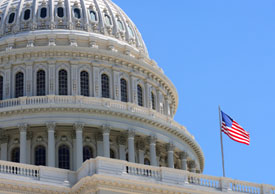This post was originally written by Steven Nadel, Executive Director of ACEEE and posted on their blog here.
 Congress is now on its summer recess, but just before leaving, the Senate made the Energy Savings and Industrial Competitiveness Act (S. 1392) the official order of business on the Senate floor upon the members’ return on September 9th. The bill was drafted by Senators Shaheen (D-NH) and Portman (R-OH) and contains useful provisions on building codes, industrial energy efficiency, and efficiency improvements to federal facilities. Dozens of amendments (many with bipartisan sponsors) are expected, and will address such topics as energy efficiency and mortgage underwriting rules, voluntary efficiency programs for leased buildings, and energy efficiency in schools and data centers. Some other more controversial amendments may also be introduced such as amendments addressing President Obama’s climate plan and the Keystone pipeline—these latter amendments are mostly political statements, and if they get a vote, are unlikely to pass. ACEEE is currently preparing an analysis of the bill and likely amendments. This analysis will be released on September 4th, just before Congress returns on the 9th.
Congress is now on its summer recess, but just before leaving, the Senate made the Energy Savings and Industrial Competitiveness Act (S. 1392) the official order of business on the Senate floor upon the members’ return on September 9th. The bill was drafted by Senators Shaheen (D-NH) and Portman (R-OH) and contains useful provisions on building codes, industrial energy efficiency, and efficiency improvements to federal facilities. Dozens of amendments (many with bipartisan sponsors) are expected, and will address such topics as energy efficiency and mortgage underwriting rules, voluntary efficiency programs for leased buildings, and energy efficiency in schools and data centers. Some other more controversial amendments may also be introduced such as amendments addressing President Obama’s climate plan and the Keystone pipeline—these latter amendments are mostly political statements, and if they get a vote, are unlikely to pass. ACEEE is currently preparing an analysis of the bill and likely amendments. This analysis will be released on September 4th, just before Congress returns on the 9th.
Key members in the House have indicated that the House will take up a companion bill introduced by Representatives McKinley (R-WV) and Welch (D-VT) after the Senate acts. In fact, the House was preparing for a hearing on the McKinley-Welch bill just before recess but the hearing was delayed until after recess due to scheduling issues. The two bills will likely differ in some respects, so negotiations will be needed between the House and the Senate to agree on a common bill—perhaps early in the new year. However, there are contentious issues to address when Congress returns, such as funding the government after September 30th and increasing the federal debt ceiling. It is possible that Senate floor action could be delayed to November, with the House after that. Still, it is a good sign that the one energy topic the House and Senate appear to agree upon is energy efficiency.
In other news, the Senate Finance Committee received limited input from senators in response to its request regarding suggested tax provisions to include as part of tax reform. ACEEE submitted comments recommending: (1) an end to “penalty depreciation” for efficient equipment used in commercial buildings, (2) extending but reforming present tax incentives for new homes and commercial buildings, and (3) adding tax incentives for retrofits to existing homes and commercial buildings that reduce energy use by at least 20%. Informed speculation is that little work on tax reform will take place this year and that instead the real work may start in 2014. This slow pace makes it likely that any final legislation will be delayed until 2015.
Finally, while Congress moves slowly, the Obama Administration appears to be stepping up work to move some important administrative rules that can save energy using existing legislative authority. Efforts are now underway on new appliance and equipment efficiency standards, new standards for trucks and manufactured homes, better treatment of efficient homes in the mortgage underwriting process, and regulation of emissions from existing power plants. Stay tuned—we’ll be writing more about these efforts in the coming months.